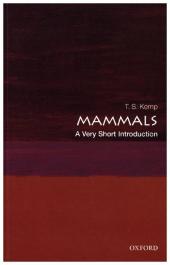 Neuerscheinungen 2017Stand: 2020-02-01 |
Schnellsuche
ISBN/Stichwort/Autor
|
Herderstraße 10
10625 Berlin
Tel.: 030 315 714 16
Fax 030 315 714 14
info@buchspektrum.de |

T. S. Kemp
Mammals: A Very Short Introduction
2017. 168 p. 25 black and white images. 175 mm
Verlag/Jahr: OXFORD UNIVERSITY PRESS 2017
ISBN: 0-19-876694-7 (0198766947)
Neue ISBN: 978-0-19-876694-0 (9780198766940)
Preis und Lieferzeit: Bitte klicken
Relative newcomers within the story of evolution, mammals are hugely successful and have colonized land, water, and air. Tom Kemp discusses the great diversity of mammalian species, and looks at how their very disparate characteristics, physiologies, and behaviours are all largely driven by one uniting factor: endothermy, or warm-bloodedness.
From a modest beginning in the form of a little shrew-like, nocturnal, insect eating ancestor that lived 200 million years ago, mammals evolved into the huge variety of different kinds of animals we see today. Many species are still small, and follow the lifestyle of the ancestor, but others have adapted to become large grazers and browsers, like the antelopes, cattle, rhinos, and elephants, or the lions, hyaenas, and wolves that prey upon them. Yet others evolved to
be specialist termite eaters able to dig into the hardest mounds, or tunnel creating burrowers, and a few took to the skies as gliders and the bats. Many live partly in the water, such as otters, beavers, and hippos, while whales and dugongs remain permanently in the seas, incapable of ever emerging
onto land.
In this Very Short Introduction T. S. Kemp explains how it is a tenfold increase in metabolic rate - endothermy or "warm-bloodedness" - that lies behind the high levels of activity, and the relatively huge brain associated with complex, adaptable behaviour that epitomizes mammals. He describes the remarkable fossil record, revealing how and when the mammals gained their characteristics, and the tortuous course of their subsequent evolution, during which many bizarre forms such as
sabre-toothed cats, and 30-tonne, 6-m high browsers arose and disappeared. Describing the wonderful adaptations that mammals evolved to suit their varied modes of life, he also looks at those of the mainly arboreal primates that culminated ultimately in Homo sapiens.
ABOUT THE SERIES: The Very Short Introductions series from Oxford University Press contains hundreds of titles in almost every subject area. These pocket-sized books are the perfect way to get ahead in a new subject quickly. Our expert authors combine facts, analysis, perspective, new ideas, and enthusiasm to make interesting and challenging topics highly readable.
Mammals: A Very Short Introduction is part of a series of very short introductions published by Oxford University Press. These are gateway books, designed to draw readers into a topic and invite them to dive deeper if the topic is of interest. In this regard, Tom Kemp has done our profession a great service. We should all have a short stack of these books available to hand out to undergraduates we hope to recruit to the study of mammalogy ... In short, this very short introduction to mammals is a welcome addition to the ... series. Christopher J Yahnke, Mammology
Dr T. S. Kemp is Emeritus Research Fellow at St John´s College, Oxford, and a widely respected expert on the evolution of mammals. He is the author of several books widely used by students, including The Origin and Evolution of Mammals (OUP, 2005), and The Origin of Higher Taxa (OUP, 2015).


